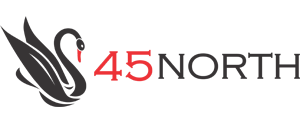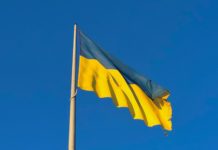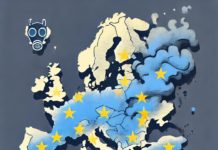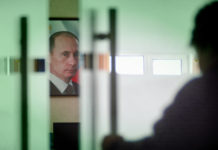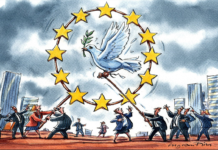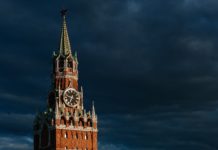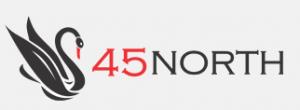In this report concerning the COVID-19 vaccine conversation on social media (Facebook) in Romania, we look at data gathered by the International Republican Institute Beacon Project, via CrowdTangle, for the month of July, to try to understand the trends and narratives that define it. In terms of the broader strategic and security context of the transatlantic partnership, we focused on Russian and Chinese narratives, as both are adversaries willing to use social media and the pandemic to advance their agendas.
Methodology
In terms of research methodology, we used data extracted from CrowdTangle, in order to sort the 20 Facebook public pages who had the most posts containing a set of keywords (in Romanian) that refer to the vaccine conversation, like “vaccine” or “vaccinated”, or names of vaccines in circulation (not necessarily approved in Romania), like “sinopharm”, “pfizer” or “astrazeneca”. Based on these keywords we selected the 20 pages that had the most posts containing one or more of these keywords in July 2021. In other words, we looked at the pages that were most active on Facebook with regards to the vaccination process and vaccines overall in July.
We limited ourselves to 20 pages in order to have a manageable data volume. Based on the versatility of CrowdTangle, we were able to see granular information regarding post volumes, post types, network maps, interactions and reactions, etc. We used this information and coupled it with our understanding of the narratives (especially Russian and Chinese) that are being peddled in the Romanian Facebook space, to better understand their mechanics and the objectives of the state actors that use them.
Regarding the narratives, as mentioned previously in our similar analysis for the first six months of 2021, the Romanian vaccine debate has been characterized by a constant competition between unbiased, factual information and misinformation. A significant part of the total posts analyzed comes from sources that might be described as profit-driven and politically related which might distort the overall vaccine conversation on Facebook. In a „no border network” that defines social media and online content, factual information has a tougher path to reach the audience. When this path is further obfuscated by Russian and Chinese narratives, it is important to exactly identify these narratives and understand their motivations, as well as debunk them.
CrowdTangle analysis
A good place to start is an overall view of the month of July regarding the keyword distribution for each day (fig. 1). Not coincidentally, Pfizer recorded 462 mentions, J&J 250, Moderna and AstraZeneca around 200 while Sputnik only 56 and Sinovac 47. Compared with June (report here), for example, we notice a significant change regarding the mentions of “sputnik”, which had recorded 128 mentions. In the same vein, the other numbers are quite similar with the month of June.
Despite the low number of mentions in July we notice two trends related to “sputnik”: some of the pages analyzed show a repulsive attitude towards this vaccine, the headlines referring mainly to the inability of the Russian Federation to deliver the ordered doses, generally to third world states; at the same time, there is a trend that promotes the combination between Sputnik vaccine and AstraZeneca, but also its effectiveness in combating the Delta variant. It is important to note which pages shared the information and how it was put into context, but this aspect is further detailed below, in the narrative section. The largest number of posts (10) is recorded on July 5 (Fig. 2), most of them promoting the fact that Russia has begun testing the administration of Sputnik V vaccine to adolescents.
Although the number of posts is significantly lower, “sputnik” mentions are relatively constant throughout the month. On the other hand, it is curious that they have fallen by more than half compared to June. Regarding the Chinese vaccines, “sinovac” (47 mentions) and “sinopharm” (7) are mostly concentrated in the middle of the month, between July 12 and July 16 (Fig. 3). During this period, the predominant news referred to Thailand’s decision to combine the sinovac and AstraZeneca vaccines.
Another topic refers to the inefficiency of Chinese vaccines compared to Pfizer. More details on the narratives are described below. The page that registered the largest number of Chinese vaccines mentions is Newsweek Romania, followed by Digi24 and Adevărul; almost all the posts refer to a possible third dose and the efficacy of Chinese vaccines.Worth mentioning that all the posts regarding the Chinese Vaccines are showing a negative average overperformance scores, except three of them the others are in the double digits, which means that the average number of interactions the posts analyzed in the selected period register is lower compared to the average number of interactions registered in the last 100 posts of the selected pages. More info about this parameter can be found here.
In terms of the distribution of links and domains, figure 4 represents a good aerial view of the vaccine conversation on Facebook and the media ecosystem in Romania, in July, 2021. As we’ve reported in our first six months of 2021 equivalent study for Romania (here), this ecosystem is skewed towards a couple of Facebook pages, which dominate by number of links/domains shared. This is certainly not a good sign, independent of the quality of the dominant news source.
Also, in most of the cases, Facebook pages share almost exclusively links from their eponymous domains. This is not the case for all of the analyzed pages. For example, B1.ro shared links from Stirile ProTv, Stirile KanalD, spotmedia.ro and other domains. This is also true for Adevărul.ro and Gandul.ro. Generally, it is a good sign to have Facebook pages sharing links/domains from a variety of sources, because the opposite encourages the formation of social media bubbles and echo chambers, which in turn encourages social polarization.
In fig. 5 we can see another angle of the links/domains shared by the analyzed Facebook pages, with a focus on interactions. In terms of interactions (keywords: “astrazeneca”, “pfizer”, “moderna”, “J&J”, “sputnik”, “sinovac”), ȘtirileProTv’s facebook.com domain (10,541) is the leading domain shared, followed by digi24.ro (6,366) and stiripesurse.ro (5,690). When it comes to the total number of posts, stiripesurse.ro is leading, by far (205 links shared); ro.sputnik.md (417) and sputnik.md (42) recorded a lower number of interactions.
Narratives
It is already a known fact that Russia and China are state actors that are more than willing to use the online discussion regarding vaccines to meet their geopolitical goals. Before delving deeper into these narratives, let’s have a look at what kind of news took the lead in July, not necessarily from foreign state-controlled media sources. There are two news articles from Antena 3 addressing the same topic which recorded, by far, the highest number of interactions.
Antena 3, a politically biased tv channel, shared in these links the controversial opinion of a 19-year-old student, who is an anti-vaxxer. One of the titles says: “Diana Paul, the young woman who defied Florin Citu, regarding the vaccine: “It is a weapon used against people“. According to available information, she is studying History at Babeș-Bolyai University in Cluj-Napoca, is a “conservative influencer”, nationalist, practicing Christian and a Trump admirer. The amount of interactions for the two post, a video and an article are very high, 43,474 and 38,250 respectively. This performance was reached in part because of the TV channel’s popularity and because of her polarizing opinion. She is quoted as saying that the vaccine contains “fear, widespread suspicion and omnipotent cunning” and that it is “a weapon used against people.” As we noticed in the first report (here), promoting skeptics and controversial opinions is a regular narrative tool used by Russian controlled media sources, like Sputnik, but in this case, it is employed by a major Romanian TV channel.
The same modus operandi, promoting controversial characters and their statements, we highlight a post from stiripesurse.ro, with 12,056 interactions, entitled “Cozmin Gușă demands the arrest of Cîțu: ‘SRI-ule, DNA-ule, is anyone on guard?” This article criticizes the current government and the investments made for the purchase of vaccine doses. Cozmin Gusa worked as an adviser to Vlad Plahotniuc, a former MP in Moldova from the Democratic Party currently a fugitive, wanted by the Moldavian authorities for fraud, money laundering and corruption. What we can see in this article is the use of the vaccine topic for crude political attacks. Regardless of the fact that the attacks are substantiated or not, the use of vaccines in political propaganda is damaging the whole vaccination process because it makes people feel that vaccines are just another topic for politicians to fight for, not something that is of paramount importance for personal health.
Russian narratives: examples and overview
Regarding the Sputnik Moldova and Sputnik Moldova-Romania pages, undoubtedly, they keep their traditional pro-Russian position. Between the two pages, the post with the largest number of interactions is published by Sputnik Moldova Romania according to which “Senator Zamfir exposes Cîțu:” The doses donated to Moldova were to expire“. which uses internal political rivalries to their advantage, in this case exacerbating a comment from an opposition politician who criticized the current PM of Romania, for trying to gain political points for a batch of over 100.000 vaccines donated to Moldova, because, according to him, the doses were set to expire. Sputnik did not verify the expiry date of that particular batch, it only pushed the conflict to their audience. We did verify the expiry date and according to an official communication for 45north.ro, from the Ministry of Health in Romania, the said batch that was donated to Moldova was set to expire at the end of September, which means it made sense to donate that batch to Moldova.
Another pervasive narrative promoted by Sputnik in July refers to the combination of the two vaccines, Sputnik Light and AstraZeneca, being hampered by politics. The title of one such article is “Onishchenko: Doctors and scientists would have long ago created a vaccine if they were not confused“ Onishchenko is the Health Minister in Russia and also the first vice-chairman of the Russian State Duma Committee on Education and Science. He tries to paint the picture that Russia is trying to avoid playing politics with regards to vaccines and cooperation in this field, which blatantly disregards basically all of Moscow’s actions that we’ve covered in our reports and that have been covered by numerous think tanks and publications in the last year. He is quoted as saying “Russia demonstrates something completely different. To study together, to exchange information, to study the possibility of common use. This is a continuation of humanist traditions, in which we cooperate, no matter who is in front of us, at a profession”.
This reaction comes in the context of a declaration from the French Foreign Minister who had publicly expressed regrets because Greece allows access on its territory to tourists and passengers vaccinated with anti-Covid vaccines produced in Russia or China.
The statements of the French minister generated an official reaction from Russia. Maria Zaharova, the spokesperson for the Russian Ministry of Foreign Affairs, is quoted by Sputnik Moldova, as saying that “We condemn France for such discriminatory remarks of its high official – which revives the spirit of neo-Nazi segregation in Europe“, peddling the narrative that the EU is somehow a reincarnation of Nazi Germany, with whom Russia fought its Great Patriotic War. This is a common narrative and it is probably mostly directed to its home audience.
Another narrative promoted by sputnik.md refers to the inefficiency of Western vaccines and the risks or side effects caused by them. One of such articles is titled: “Increased risk of developing a rare neurological disease after vaccination” which is misleading because Johnson & Johnson, the company that produces the vaccine stated in the article that could cause neurological damage, states that the risk of this happening is very low, and the rate of reported cases exceeds by a small margin the base rate in the general population.
Chinese narratives: examples and overview
China is not particularly active in the Romanian cyberspace and Facebook space but we can learn about its narratives on the website of the Romanian Service of China Radio International (CRI). Also, in the 20 Facebook pages that we have analyzed, there is no state controlled Chinese page, or a page controlled by a private Chinese company, for that matter.
July was no exception with regards to China’s focus on anti-American propaganda. CRI published a July article titled: „US has become the largest exporter of viruses“, where it accuses the U.S. that it “exports” the virus, due to the fact that it failed to manage the epidemic and people who travelled to other countries, from the U.S. infected the residents of said countries. This, of course, ignores the safety procedures adopted by countries where Americans travelled, restrictions that were for their official authorities to define and apply. Another common narrative in this article is to demonize American troops stationed abroad: “U.S. global military operations, military bases and biological laboratories installed in many countries are major threats to the global fight against the pandemic.“. There is no proof provided or available. It should be noted that we saw a similar narrative / disinformation operation from Russia, with regards to NATO troops in Latvia.
Another recurring narrative pushed by China media channels is America’s intention to politicize the pandemic: This article posted in July says „Western countries led by the United States have threatened and put pressure on scientists to submit to American hegemony and support the hypothesis of leaking the new coronavirus from the laboratory.”
Anti-American sentiment is pervasive in a wide range of different topics of interest to Beijing, like Hong Kong or Taiwan. With regards to Hong Kong, China is trying to identify itself as the main actor responsible for the development of Hong Kong while painting the Americans in a bad light due to Hong Kong related sanctions, which the title of the article says that “don’t scare anyone”, implying that they are targeting the “region”, which is false; the sanctions affect individuals (special designated persons related to China’s efforts to cripple Hong Kong’s autonomy) and entities, but they are not blanket sanctions affecting the people of Hong Kong (more details about the sanctions are available here)
Taiwan tends to be a more delicate issue for Beijing than Hong Kong and this is seen in the vitriol of associated articles. This July article is called “Who digs someone else’s hole, will fall in it” and it basically accuses the U.S. of meddling in China’s “internal affairs” when the U.S. engages with Taiwan. Another interesting angle of Chinese narrative in July refers to the 100th anniversary of the founding of the Chinese Communist Party (CCP). In this sense, articles glorifying the Communist Party appear on the CRI page. In Beijing’s view, the party achieved its goals and created a decent society; poverty has been eliminated and by 2035 socialist modernization will be achieved.
This report has been prepared with support from IRI’s Beacon Project. The opinions expressed are solely those of the author and do not reflect those of IRI.
